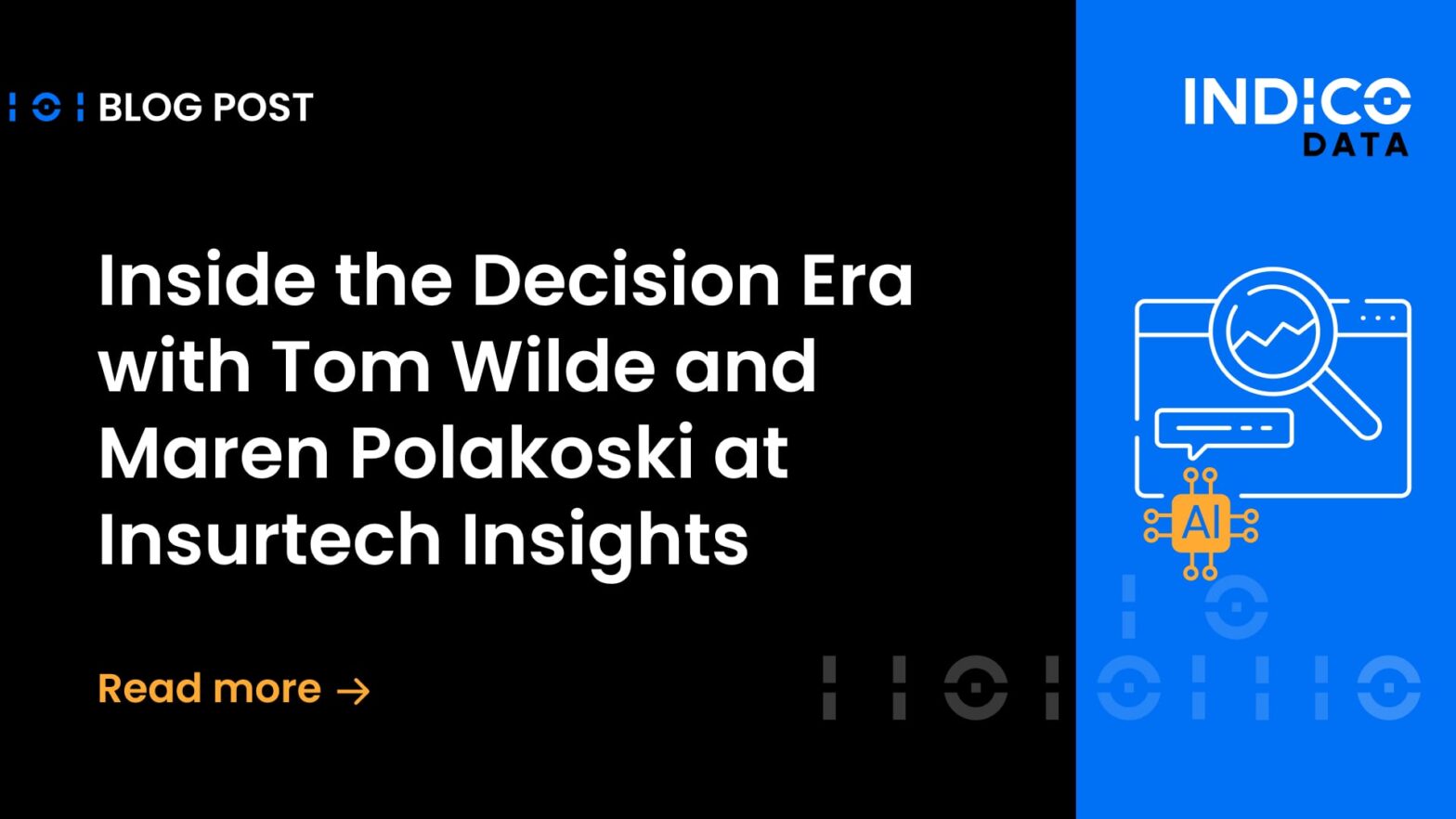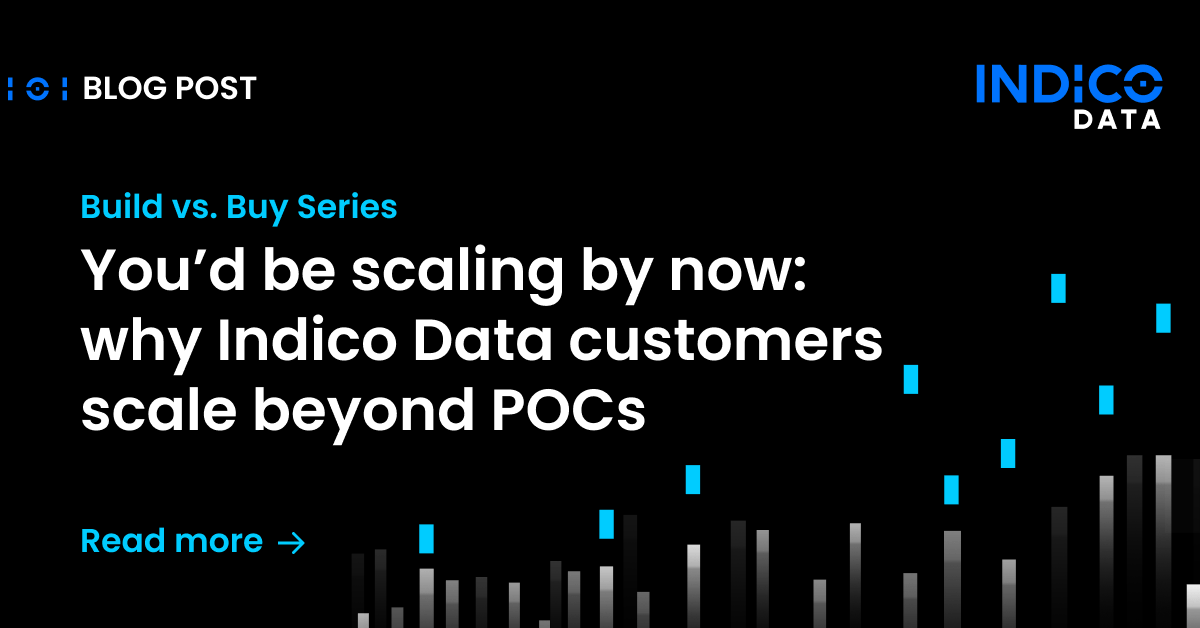In this episode of Unstructured Unlocked, co-hosts Chris Wells and Michelle Gouveia welcomed Dan Faggella, CEO and founder of Emerj Artificial Intelligence Research. Dan, an AI industry veteran, brought a wealth of knowledge from his extensive experience in market research and AI application within enterprise settings. His company, Emerj, stands at the forefront of analyzing the ROI impact of AI across various industries—a topic we at Indico are enthralled by as an AI data intake solutions company, especially within the insurance industry.
Listen to the full podcast here: Unstructured Unlocked episode 45 with Daniel Faggella, CEO at Emerj Artificial Intelligence Research
Emerj AI Research: bridging AI and enterprise
Dan Faggella has been spearheading Emerj AI Research as CEO for the past eight years. Emerj focuses on understanding how AI technologies impact enterprises, primarily targeting Fortune 1000 companies. With over 1,300 podcast interviews and numerous surveys, Emerj has become a significant player in B2B AI discussions, often featuring high-profile guests like CIOs from Goldman Sachs and AI leads from Raytheon. The AI in Business Podcast by Emerj, hosted by Dan, boasts nearly 2 million downloads and has become a go-to resource for insights into AI’s role in business transformation, including critical applications in the insurance sector.
AI’s evolution: from buzzword to business imperative
Dan reflected on the journey of AI adoption over the past decade, describing the initial phase as a “silver bullet buzzword” era where venture capital was easily attracted by the mere mention of AI. However, this period was marked by misconceptions and a lack of substantial enterprise value. A turning point came with China’s AI strategy, which ignited a global surge in AI investments. According to Dan, there was “not a lot of enterprise value, [and] a lot of misconceptions on the founder side and the buyer side, but that was sort of an exciting place to see things kick off.”
The COVID-19 pandemic further accelerated AI adoption, with companies raising substantial amounts of capital and beginning to embed AI more deeply into their operations. This period saw AI transitioning from innovation projects to integral components of enterprise workflows, particularly in insurance, where AI has revolutionized underwriting and claims processing. Indico itself stands as a testament to this industry-wide transition, offering insurance companies practical solutions for data intake that streamline their workflows and improve decision-making accuracy.
Related content: How AI enhances precision, speed, and efficiency in insurance underwriting
The generative AI revolution
Dan was particularly enthusiastic about the current wave of generative AI, which he believes is “drastically under-hyped.” He explained that generative AI’s ability to create content, from text to code, represents a significant leap forward. Unlike previous AI iterations, generative AI is accessible and usable out of the box, making it a versatile tool for various applications. Dan envisions a future where AI will fundamentally transform core insurance processes, such as underwriting, claims management, and customer service.
Balancing opportunities and risks
Despite his optimism, Dan acknowledged the inherent risks associated with AI. He drew an analogy with nuclear technology, noting that while AI holds tremendous potential for positive impact, it also poses significant risks. The rapid development and deployment of AI necessitate careful consideration of ethical and regulatory implications. “I think there’s a nuclear correlate there,” he remarked. “I think it also has the ability to sort of unlock all kinds of splendid and wonderful things.”
Dan stressed the importance of a balanced approach to AI implementation. He advises insurance companies to adopt a phased strategy, starting with experimentation and gradually integrating AI into critical workflows. This method allows organizations to assess the technology’s value and mitigate potential risks effectively. Indico follows the same strategies with our own clients, advising a successful and careful integration of AI into workflows that need it—rather than a reckless or rushed implementation that overwhelms or endangers the company.
Related content: The imperative of data in decision-making in insurance with Tom Wilde and Robin Merttens
Generative AI in action: transforming insurance
When asked about which industries will benefit most from generative AI, Dan highlights insurance as a sector already seeing substantial AI-driven advancements. He explains, “For insurance AI, for example, claims and underwriting… has always been 70, 80% of the action in terms of enterprise AI in insurance.” Indico is proud to be leading the charge in the insurance sector, offering intelligent document intake solutions through AI that enable faster, more accurate decision-making and streamline claims processing.
Forward facing: the future of AI and insurance
As the conversation wraps up, Dan reflected on the evolving landscape of AI and its potential to reshape the insurance industry. He emphasized the need for continuous learning and adaptation, both for organizations and individuals. The future of AI, according to Dan, will be defined by its ability to integrate seamlessly into insurance processes, driving efficiency and innovation—and as an organization focused on making AI incredibly powerful through practical implementation, Indico could not agree more.
Dan Faggella’s insights offer a compelling vision of AI’s transformative power in insurance. His perspective underscores the importance of strategic planning and thoughtful implementation in harnessing AI’s full potential. As AI continues to evolve, companies like Emerj AI Research and Indico Data will continue to play crucial roles in guiding insurance enterprises through this exciting and complex journey.
For a deeper understanding of the intricacies discussed and to hear firsthand from the experts, tune into the full episode of Unstructured Unlocked on your favorite platform, including:
Subscribe to our LinkedIn newsletter.
Frequently asked questions
- How can small to medium-sized insurance companies leverage AI if they lack the resources of Fortune 1000 companies? Small to medium-sized insurance companies can still leverage AI by focusing on scalable and cost-effective solutions tailored to their needs. They can start with AI tools that offer specific functionalities such as document automation, chatbots for customer service, and fraud detection. Partnering with AI vendors that provide cloud-based solutions can help these companies avoid large upfront investments in infrastructure. Additionally, they can participate in industry consortiums or networks to share AI resources and knowledge. By adopting a phased approach, starting with pilot projects and gradually expanding AI use, smaller companies can manage costs and demonstrate value incrementally.
- What specific steps should insurance companies take to mitigate the risks associated with AI implementation? To mitigate the risks associated with AI implementation, insurance companies should start by conducting a comprehensive risk assessment to identify potential issues related to data privacy, algorithmic bias, and operational disruptions. Developing a governance framework is essential, which includes establishing policies and procedures for AI usage, along with ethical guidelines and ensuring compliance with regulatory standards. Ensuring data quality is crucial, as using high-quality, representative data to train AI models can minimize biases and errors. Implementing robust security measures is also vital to protect AI systems and data from cyber threats, involving encryption, access controls, and regular security audits. A phased implementation approach can be beneficial, starting with pilot projects to test AI solutions in a controlled environment before scaling up. Continuous monitoring of AI systems for performance, accuracy, and unintended consequences is necessary, with adjustments made as required. Additionally, training employees on AI capabilities and limitations is important to ensure they can effectively manage and supervise AI tools.
- What are some real-world examples of insurance companies successfully implementing generative AI, and what benefits have they seen? Real-world examples of insurance companies successfully implementing generative AI include Progressive Insurance, Allianz, and MetLife. Progressive uses generative AI to streamline claims processing by automatically generating detailed reports and summaries from raw data, reducing the time adjusters spend on documentation and improving accuracy. Allianz has implemented AI to enhance customer service through AI-driven chatbots that handle common inquiries, allowing human agents to focus on more complex cases. This has led to improved customer satisfaction and operational efficiency. MetLife uses generative AI for underwriting by analyzing and generating insights from large volumes of historical data, which has improved underwriting accuracy, reduced processing times, and enabled more personalized policy offerings. These examples demonstrate that generative AI can provide significant benefits such as increased efficiency, reduced costs, and enhanced customer experiences by automating routine tasks and enabling more informed decision-making.


